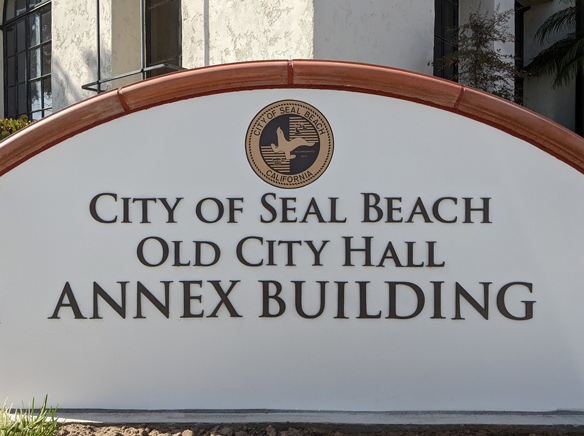The City Council this week approved a proposal to have the council approve agendas after the public comment (“oral communications”) part of a meeting.
That’s how meetings will be conducted until staff returns with a formal resolution to change the council’s written policy.
Generally, the council has approved the agenda before public comment. On some agendas, public comment takes place.
The vote was 4 yes, with District Five Councilman Nathan Steele abstaining.
District Three Councilwoman Lisa Landau, who proposed the change, argued that it would allow residents a real voice in their government, not just a gesture.
Steele said that when a council member pulls something from the Consent Calendar, staff has to make a presentation without time to prepare. He called it a professional courtesy.
Background
“At the September 11, 2023 Council meeting, Council Member Landau requested that staff agendize a discussion item for the Council to consider revising the Council agenda format to hear Oral Communications prior to Approval of the Agenda,” wrote City Clerk Gloria Harper in her staff report.
“Council Policy 100-03 includes a discussion regarding the Council’s approval of the order of the agenda, although it does not state where that approval occurs on the agenda,” Harper wrote.
“This policy was last modified by the City Council per unanimous adoption of Resolution 7411 at its June 12, 2023 meeting to memorialize the City Council Norms and City Council and City Manager Commitments following the April 4, 2023 Strategic Planning Workshop,” Harper wrote.
According to Policy 100-03: “Matters shall be heard in the order printed on the City Council agenda. However, with Council approval, if several community members are present to speak on that specific agenda item or if the Council otherwise determines that it is in the public interest to change the order of the agenda, the Council may hear agenda items out of their prescribed order on the printed agenda. The appropriate time to rearrange the order of the agenda is while considering the approval of the agenda.”
The policy also says the city manager, the city attorney, or a member of the public may ask the presiding officer to “remove items listed on the Consent Calendar for individual consideration.”
Individual council members may also remove items from the Consent Calendar for separate discussion, according to Policy 100-03.
“There is no legal requirement that City Council must approve the agenda at the beginning of the meeting before oral communications; in fact, there is no legal requirement that that City Council must affirmatively approve the agenda at the meeting,” Harper wrote.
“The Council Rules of Procedure provide that the Council shall conduct its meetings in accordance with Robert’s Rules of Order, except as amended by the Charter, the Brown Act, or other Council policy,” Harper wrote.
“Section 41 of Robert’s Rules of Order states that it is customary for a body to approve the agenda for each meeting and, where it does, it is usually done at the outset of the meeting,” Harper wrote.
“However, this is not mandatory, and the Council is free to consider changing the standard agenda order as it deems appropriate,” Harper wrote.
Discussion
Resident Susan Perrell recommended that the council change meeting agendas by placing public comment before agenda approval. “This would allow the council to become more informed about the agenda before they move to approve it,” Perrell said.
“For example, if a member of the public had concerns or new information, about an item that had been placed on the Consent Calendar, they could share that information or concerns with the council during oral communications,” Perrell said.
“The council could then pull the item from the Consent Calendar and open the item up for further discussion and consideration, instead of rubber-stamping it,” Perrell said.
Perrell saw no downside to the proposal.
“The public will make the same comments they were going to make,” Perrell said.
But, she argued, moving the comments would make their statements more actionable.
“A strong democracy requires government to base its decisions on public input,” Perrell said.
Perrell said putting public input before government decisions will make the government’s decisions and our democracy more sound.
Landau, reading from a prepared statement, made a similar argument for her proposal.
“All of our residents and businesses need to know that we value their time and what they have to say and know that we are listening and their voices can make a difference,” Landau said.
“As Abraham Lincoln said, freedom is government that is a government of the people by the people and for the people we use the representatives should welcome real participation in the process of governing,” Landau said.
“We saw two separate meetings, what can occur when non-routine items are put on the consent calendar where the contract should have been pulled for further discussion,” Landau said.
“And then also in a positive note the parking agreements that we pulled, the council members themselves had many questions, great questions and got a lot of excellent answers, boosting residents competence in our government,” Landau said.
“As I researched this item with other cities, I found our surrounding cities of Huntington Los Al and Cypress all have oral communication before approving the agenda,” Landau said.
“If there are a lot of people with an interest in a certain item that is placed at the end of the agenda. We can then move it I have not heard one reason not to place oral communication before approving the agenda,” Landau said.
District Four Council Member Schelly Sustarsic said she also looked into this. Sustarsic said she gathered from the Brown Act, which says you are supposed to allow the public to participate, but it didn’t seem that the way Seal Beach does it is friendly to public participation. She said she consulted Robert’s Rules of Order, which she said required a two-thirds vote to change. That struck Sustarsic as more complicated than putting something after public comment.
Sustarsic said Cypress, Los Alamitos, Westminster, did not approve the agenda before public comment.
Councilman Steele had a question.
“My question would be this, for example, on that contract and the gentleman standing up and suggesting that we were letting a contract out to a company that wasn’t qualified and I was here for that. I remember that,” Steele said.
“Would I be able to at that point, even after having approved the agenda, be able to pull that item out of the Consent Calendar or not?” Steele asked.
“The procedure would be to ask the mayor for approval to pull the item from the Consent Calendar, and it would normally be the practice of most bodies as a courtesy to allow that member by unanimous consent to have that item,” said City Attorney Nicholas Ghirelli.
“And the reason would be that if one council member has a comment or concern about something on the Consent Calendar, it’s not really appropriate then to have the item on the Consent Calendar because the item is not routine,” Ghirelli said.
He said the council has the right to amend the agenda.
Steele, referring again to the man who had concerns about a contract, asked if the council would have pulled the item from the Consent Calendar if he had asked the council to do so.
District Two Council Member Tom Moore said he probably would have asked for consensus.
Steele said he didn’t have a problem one way or the other with changing the order of the agenda.
Ghirelli said at two other cities where he serves as city attorney, there is no formal action to approve the agenda.
Moore said he liked the idea of moving public comment before the council approved the agenda.
Ghirelli said council policy already has language allowing the public to ask the council to pull something from the Consent Calendar.
“I just want to clarify that, after we approve the agenda at that, at that point we can any one of us can remove an item from the consent calendar,” Landau said.
“But after we approve the agenda, and we hear a couple of comments, and then we want to remove something for discussion. Now it takes a majority. So that’s not guaranteed that it’s gonna get removed because there has to be a majority right?” Landau asked.
“Yes, the council has to act,” Ghirelli said.
“At that point, I have to rely on two other people if I want to pull something, right?” Landau asked.
“So whereas if we have public comment first, then we can flush all that out, pull things that need to be discussed and if there’s a need for that, and then we approve the agenda,” Landau said.
“I think that also gives the perception of that settles matters,” Sustarsic said.
Ghirelli said he didn’t agree with that.
District One Council Member Joe Kalmick asked City Manager Jill Ingram if this issue had come up in the last 10 or 11 years. (Earlier in the meeting, Ingram said she had been with the city for 15 years.)
“No, I haven’t seen an issue where council colleagues have not given the professional courtesy and respect of their colleagues to either agendize an item or to pull an item,” Ingram said.
“My concern is as we get into maybe more contentious issues that the city is facing, you know, there might not be that guarantee that we’ll get the majority if I pull something, or any one of us pull something after the agenda has been approved. So I’d like to make a motion,” Landau said.
Ingram asked that the council give staff the courtesy of letting her know when they plan to pull an item off the Consent Calendar.
“I’m just asking that we maintain that commitment with each other that you still continue to do that knowing you know, there’s going to be times when you’ll hear something with this new process if it passes that you’ll remember that the whole point of that is giving us the courtesy and the benefit of knowing that you intend to pull an item so that we have the ability to be prepared for the meeting to present an item and be available for questions,” Ingram said.
After further discussion, Ghirelli asked if the council wanted to direct City Clerk Gloria Harper to change the order of the agenda or to bring back a resolution to formally amend the written council policy.
“So I would like to make a motion that going forward beginning with the next council meeting all city agendas Council commission committees and boards place oral communications on the agendas before approving the agenda or pulling items from the consent calendar,” Landau said.
“I also ask that this policy be memorialized in accounting policy and policy and procedures folio,” Landau said.
Moore seconded the motion.
The next item on the agenda was the Consent Calendar. In case readers are wondering, nothing was pulled from this week’s Consent Calendar.












